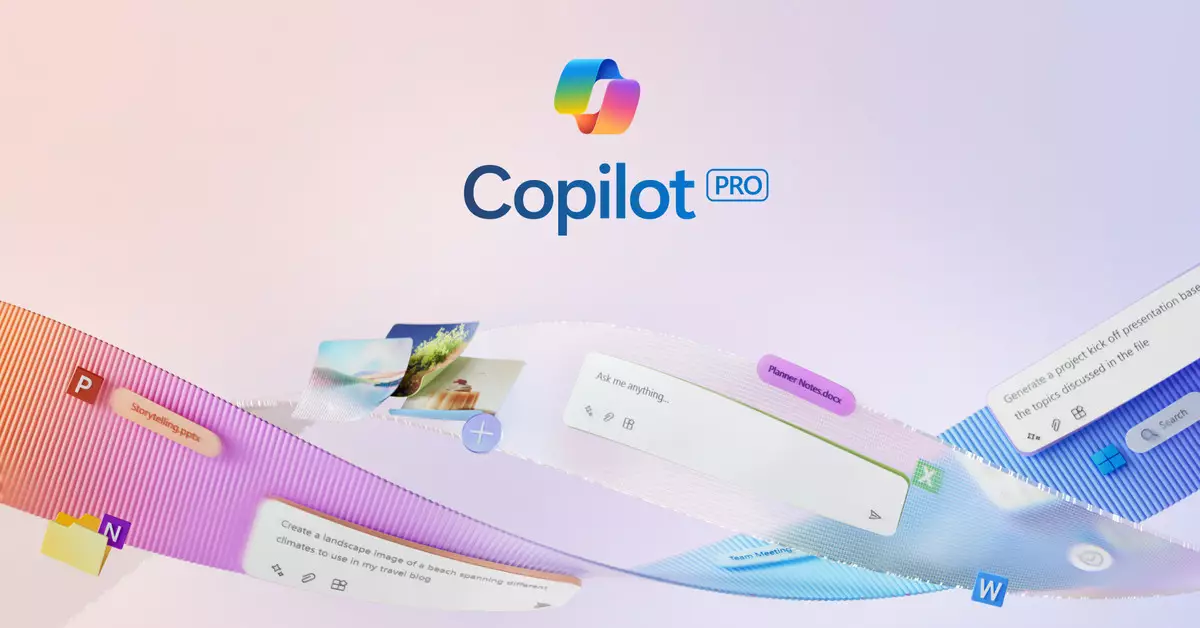Microsoft has been a stalwart in the tech world for decades, constantly evolving its offerings to meet consumer demand. Recently, however, the tech giant has signaled a notable shift in its strategy around AI features included within its Microsoft 365 subscriptions. After months of consideration and consumer feedback, Microsoft is backtracking on its initial plans to charge subscribers an additional fee for AI capabilities, specifically the much-discussed Copilot Pro. This move raises questions about the company’s direction and its commitment to enhancing user experience without imposing heavy costs.
In a surprising turn of events, Microsoft announced that it will be incorporating Copilot Pro features into Microsoft 365 Personal and Family subscriptions without imposing the previously proposed $20 monthly fee. This decision only applies to certain markets—Australia, New Zealand, Malaysia, Singapore, Taiwan, and Thailand—indicating a calculated trial phase. Microsoft mentioned in a recent press release that feedback from users has played a crucial role in shaping this decision, emphasizing its commitment to listening to its customers while iteratively improving its software’s functionalities.
This transformation in accessibility to AI features like Copilot Pro comes on the heels of the product’s introduction nine months ago. Subscribe to Microsoft 365 now, and users will find enhanced capabilities across essential apps: Word, Excel, PowerPoint, and Outlook, to name a few. The incorporation of these advanced AI functionalities is a strong indicator that Microsoft aims to be at the forefront of digital work tools that enhance productivity and creativity.
As part of the enhancements, Microsoft is also adding its Microsoft Designer app to the Microsoft 365 Personal and Family packages in these selected markets. This presents an excellent opportunity for users to benefit from a more enriched toolset, allowing creative professionals to leverage AI to streamline their workflow.
However, there is a catch. Only the main subscriber of a Microsoft 365 Family subscription can utilize Copilot features, limiting the benefits for other family members. This could potentially cause frustration among users who hope to share the benefits of their subscription. With the balance of access and competition so delicate, this may not be the best approach to strengthen user loyalty.
Incorporating these new features, however, comes alongside a price increase. Microsoft has made it clear that while additional features are being offered, the overall subscription cost will reflect the perceived value of these upgrades. For instance, Microsoft recently announced price increases for monthly subscriptions in the selected markets, raising costs by varying amounts—$4 AUD for Family subscriptions and $5 AUD for Personal subscriptions in Australia.
Interestingly, this increase is significantly lower than Microsoft’s previous intention to charge an additional $33 AUD for Copilot Pro alone. Although the company claims the price adjustment aligns with added value over the past decade, it raises concerns about the overall direction of pricing for such a service. Market analysts predict that similar increases may eventually cascade into U.S. and European spaces, causing potential upheaval among existing subscribers.
By strategically selecting these specific markets for trial, Microsoft may be gauging consumer reactions and economic implications before deploying similar changes worldwide. The Copilot Pro initiative, initially met with skepticism, underscores the challenges of monetizing AI capabilities effectively. Many consumers have expressed that the previous price tag was hardly justifiable, questioning the longevity and utility of such features.
Microsoft’s experience offers valuable insights for other tech companies exploring similar AI innovations. Understanding user expectations is paramount, while attempting to balance innovation with affordability becomes a tenuous undertaking in the competitive landscape of today’s digital tools.
Ultimately, Microsoft’s adjustments to its 365 subscription model reflect a responsive approach to consumer demands while still spotlighting the complexities surrounding pricing structures in the tech industry. Forging ahead with an experiment that allows users to access AI functionalities without prohibitive additional fees demonstrates a commitment to enhancing user experience. How this will play out as these models move closer to larger markets, however, remains to be seen. As consumers continue to navigate the evolving tech landscape, such developments will likely play a pivotal role in shaping their perceptions and loyalty toward the Microsoft brand.

